If you've ever read up on SEO and managed to make your way through all the clutter (wild west out there!), you'll know how important link building is. Link building is the process of acquiring a link from another website to your own website. It has been one of the hottest and most debated topics in the SEO world for as long as I can remember. There are so many aspects to it, from dodging Google's algorithms that target links to relevance to anchor text and so the list goes on. Link building is arguably one of the most complex aspects of SEO. Today I'm going to walk you through a method to acquire links that you can take away and do by yourself. Follow along, take some notes and get ready to learn!
Let's fix those broken links 😉
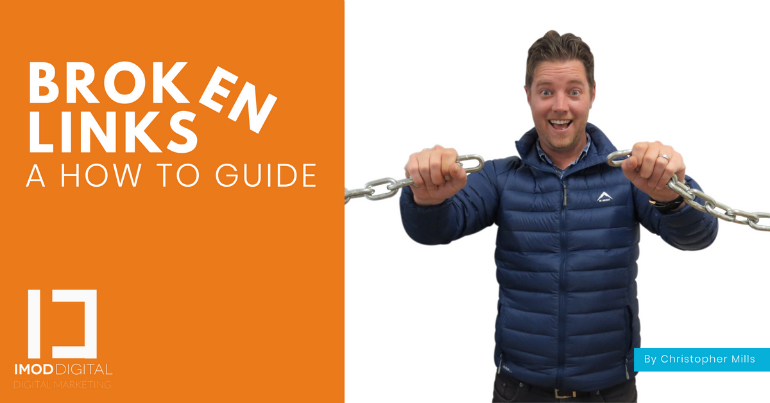 This 3-step process is one of the easier strategies for acquiring links but it works incredibly well. The secret is to be patient and take your time when researching. One might say that the easier or quicker it is to acquire a link, the less likely the link will bring great value. Building links shouldn't be seen as a rush and any professional will tell you that you should acquire the links slowly and not all at once to get the most value and not have Google start questioning your website.
Grab your thinking hat...
This 3-step process is one of the easier strategies for acquiring links but it works incredibly well. The secret is to be patient and take your time when researching. One might say that the easier or quicker it is to acquire a link, the less likely the link will bring great value. Building links shouldn't be seen as a rush and any professional will tell you that you should acquire the links slowly and not all at once to get the most value and not have Google start questioning your website.
Grab your thinking hat...
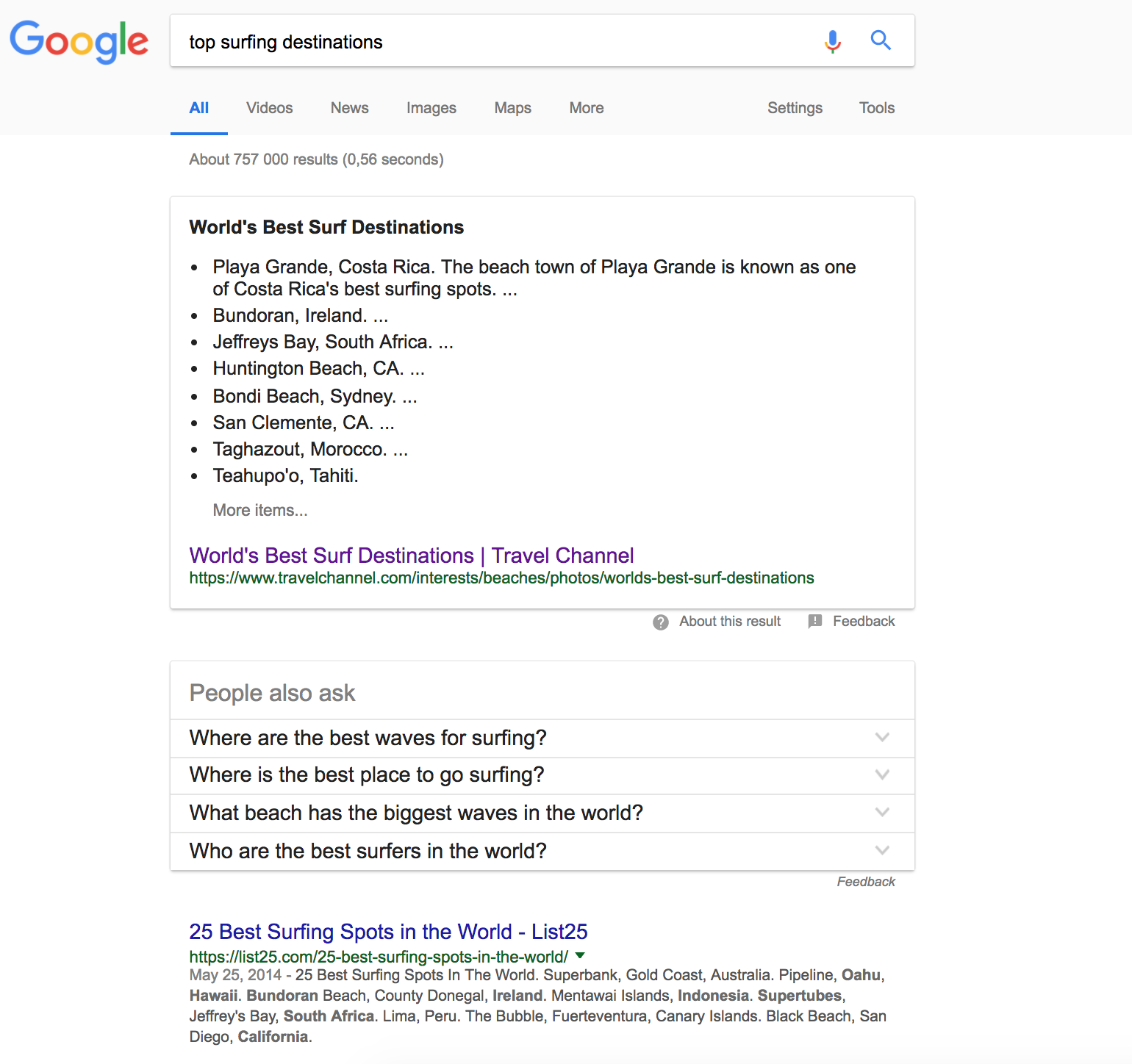 Once you've performed your search, look through the results and open up those websites that you feel would be worth acquiring a link from and that would benefit from giving you a link. Don't overthink this process, most of the websites appearing on the first page of Google have been vetted by Google so there's a very good chance that they're credible. Open them up!
Get your tools ready...
Once you've performed your search, look through the results and open up those websites that you feel would be worth acquiring a link from and that would benefit from giving you a link. Don't overthink this process, most of the websites appearing on the first page of Google have been vetted by Google so there's a very good chance that they're credible. Open them up!
Get your tools ready...
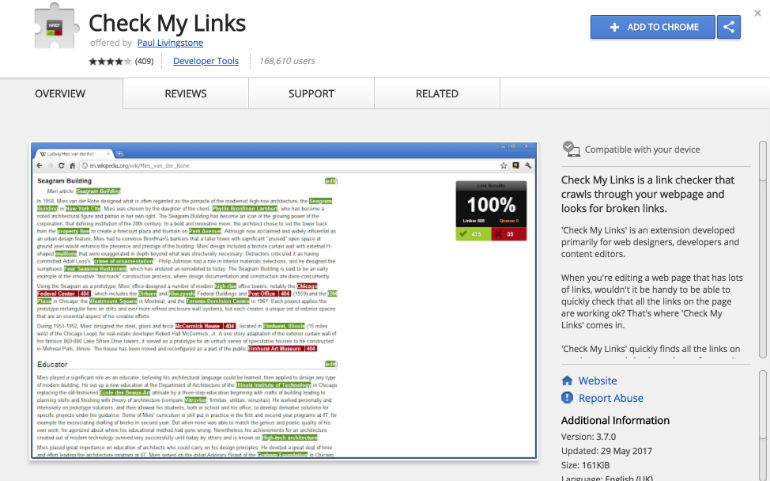 You'll be surprised how easy it is to find broken links. We don't have a client in the surfing niche so when writing this article, I randomly picked the niche and started testing things out - I didn't pre-test niches because I wanted this to be a live example to show that I could find links really quickly. I opened up Google, searched for "top surfing destinations" and then opened up the first several websites that appeared in the search results. Following this, I ran the extension on each of the pages that had loaded and within 5 minutes found a broken link:
You'll be surprised how easy it is to find broken links. We don't have a client in the surfing niche so when writing this article, I randomly picked the niche and started testing things out - I didn't pre-test niches because I wanted this to be a live example to show that I could find links really quickly. I opened up Google, searched for "top surfing destinations" and then opened up the first several websites that appeared in the search results. Following this, I ran the extension on each of the pages that had loaded and within 5 minutes found a broken link:
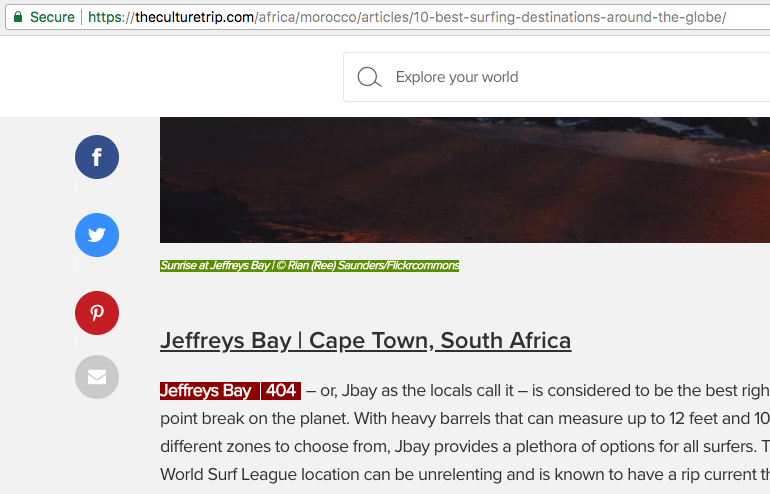 In the screenshot above, you'll see that "Jeffreys Bay" is highlighted in red and says "404" next to it. This means that the link is broken and the "404" indicates that it's pointing to a dead website. The website was meant to link to http://www.capetownsurfing.com/tours/jeffreys-bay-tour with the "Jeffreys Bay" anchor text but this link no longer exists.
So, here we have an article that appears high up in the search results for what is a fairly competitive industry and we've found an opportunity. In this instance, the article is meant to be linking to a website or article that is about a surfing tour in Jeffrey's Bay but because it's broken, anyone who clicks on the link will reach a dead end.
Opportunity knocks!
PS. It took me literally 5 minutes to find this link opportunity and there were another 2.
Let's get a link...
In the screenshot above, you'll see that "Jeffreys Bay" is highlighted in red and says "404" next to it. This means that the link is broken and the "404" indicates that it's pointing to a dead website. The website was meant to link to http://www.capetownsurfing.com/tours/jeffreys-bay-tour with the "Jeffreys Bay" anchor text but this link no longer exists.
So, here we have an article that appears high up in the search results for what is a fairly competitive industry and we've found an opportunity. In this instance, the article is meant to be linking to a website or article that is about a surfing tour in Jeffrey's Bay but because it's broken, anyone who clicks on the link will reach a dead end.
Opportunity knocks!
PS. It took me literally 5 minutes to find this link opportunity and there were another 2.
Let's get a link...
 From here you can reach out via a direct message on either platform or investigate further:
From here you can reach out via a direct message on either platform or investigate further:
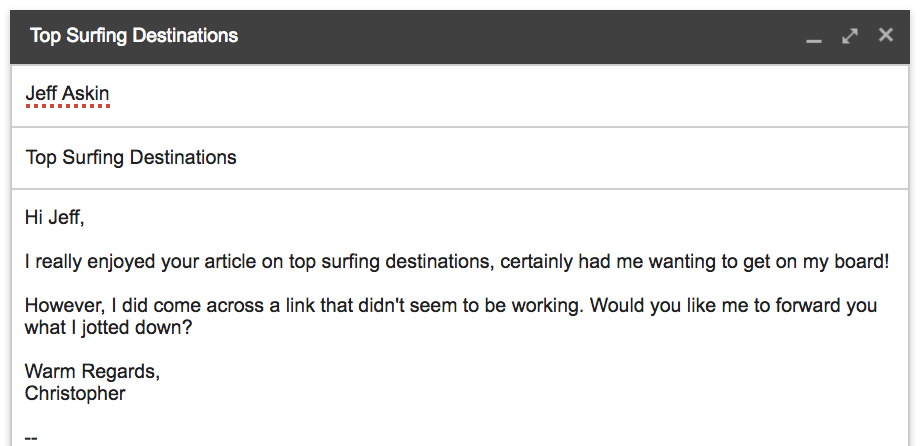
 This 3-step process is one of the easier strategies for acquiring links but it works incredibly well. The secret is to be patient and take your time when researching. One might say that the easier or quicker it is to acquire a link, the less likely the link will bring great value. Building links shouldn't be seen as a rush and any professional will tell you that you should acquire the links slowly and not all at once to get the most value and not have Google start questioning your website.
Grab your thinking hat...
This 3-step process is one of the easier strategies for acquiring links but it works incredibly well. The secret is to be patient and take your time when researching. One might say that the easier or quicker it is to acquire a link, the less likely the link will bring great value. Building links shouldn't be seen as a rush and any professional will tell you that you should acquire the links slowly and not all at once to get the most value and not have Google start questioning your website.
Grab your thinking hat...
#1 Find a Site
The first step to this strategy is to track down a website that you would like to get a link from. There are so many ways to do this but one of the most obvious is to open up Google and search for something that is related to what your website (or article). For the sake of explanation, I'm going to use an example as I feel it will make it easier to understand. So, let's say you own a surfing tours company or have a client that owns a surfing tours company, you might want to search for something like "surfing destinations" in Google to see what comes up. The idea here is to find similar websites that don't compete directly with each other - you don't want to steal the traffic away from the website you're going to pitch to, but rather add value to it. In other words, it's hard to get a link from a company that offers surfing tours if that's what you do, why would they want to give you a link and stand the chance of losing business to you - hence looking for similar sites or on-topic sites. Perhaps think about it this way, the author of the website you've found may be interested in linking to you because it adds value for his or her audience and will extend his or her article. Let's do a quick search: Once you've performed your search, look through the results and open up those websites that you feel would be worth acquiring a link from and that would benefit from giving you a link. Don't overthink this process, most of the websites appearing on the first page of Google have been vetted by Google so there's a very good chance that they're credible. Open them up!
Get your tools ready...
Once you've performed your search, look through the results and open up those websites that you feel would be worth acquiring a link from and that would benefit from giving you a link. Don't overthink this process, most of the websites appearing on the first page of Google have been vetted by Google so there's a very good chance that they're credible. Open them up!
Get your tools ready...
#2 Find Broken Links
Once you've got the websites open in your browser, it's time to download Check My Links. Check My Links is a Google Chrome extension that finds broken links on a website. In other words, when you're looking at a website you can run the extension and it'll highlight the links that point to broken or non-existent destination websites. You'll be surprised how easy it is to find broken links. We don't have a client in the surfing niche so when writing this article, I randomly picked the niche and started testing things out - I didn't pre-test niches because I wanted this to be a live example to show that I could find links really quickly. I opened up Google, searched for "top surfing destinations" and then opened up the first several websites that appeared in the search results. Following this, I ran the extension on each of the pages that had loaded and within 5 minutes found a broken link:
You'll be surprised how easy it is to find broken links. We don't have a client in the surfing niche so when writing this article, I randomly picked the niche and started testing things out - I didn't pre-test niches because I wanted this to be a live example to show that I could find links really quickly. I opened up Google, searched for "top surfing destinations" and then opened up the first several websites that appeared in the search results. Following this, I ran the extension on each of the pages that had loaded and within 5 minutes found a broken link:
 In the screenshot above, you'll see that "Jeffreys Bay" is highlighted in red and says "404" next to it. This means that the link is broken and the "404" indicates that it's pointing to a dead website. The website was meant to link to http://www.capetownsurfing.com/tours/jeffreys-bay-tour with the "Jeffreys Bay" anchor text but this link no longer exists.
So, here we have an article that appears high up in the search results for what is a fairly competitive industry and we've found an opportunity. In this instance, the article is meant to be linking to a website or article that is about a surfing tour in Jeffrey's Bay but because it's broken, anyone who clicks on the link will reach a dead end.
Opportunity knocks!
PS. It took me literally 5 minutes to find this link opportunity and there were another 2.
Let's get a link...
In the screenshot above, you'll see that "Jeffreys Bay" is highlighted in red and says "404" next to it. This means that the link is broken and the "404" indicates that it's pointing to a dead website. The website was meant to link to http://www.capetownsurfing.com/tours/jeffreys-bay-tour with the "Jeffreys Bay" anchor text but this link no longer exists.
So, here we have an article that appears high up in the search results for what is a fairly competitive industry and we've found an opportunity. In this instance, the article is meant to be linking to a website or article that is about a surfing tour in Jeffrey's Bay but because it's broken, anyone who clicks on the link will reach a dead end.
Opportunity knocks!
PS. It took me literally 5 minutes to find this link opportunity and there were another 2.
Let's get a link...
#3 Contact Article Author
Okay, so we've found a broken link and now it's time to decide what to do. We have a few options:- Create a specific piece of content on our website that would be perfect for someone clicking on that link to come to, or
- We already have content in place that would work for this.
 From here you can reach out via a direct message on either platform or investigate further:
From here you can reach out via a direct message on either platform or investigate further:
- See if Jeff has his own website with direct contact details, or
- Use another Chrome extension such as Email Hunter, or
- Perform a Google search on his name to see if you can track him down.

